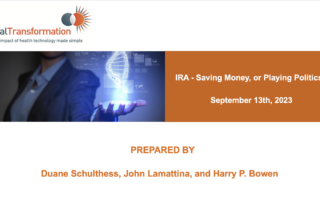IRA – Saving Money, or Playing Politics?
IRA’s drug negotiation choices seem to be much more about the 2024 election than Medicare cost savings in 2026.
By Duane Schulthess, John Lamattina, and Harry P. Bowen
September 13th, 2023
On Tuesday August 29th, the Biden Administration and the Centers for Medicare & Medicaid Services (CMS) announced the first 10 drugs to be selected as part of their signature legislation, the Inflation Reduction Act (IRA).
The linchpin of the IRA has been to lower total Medicare costs. The text of the IRA states clearly that the drugs to be chosen for negotiation are those, “… drugs with the highest total expenditures being ranked the highest.” This language is completely unambiguous; drugs with the greatest total expenditures for taxpayers are the ones to be negotiated.
The IRA also includes provisions that drugs soon to be subject to generic or biosimilar competition are excluded from negotiation. This is logical as once a drug loses its patent exclusivity its price falls rapidly.
Our firm, Vital Transformation (VT), has been at the center of the IRA debate for well over a year. Given the IRA’s clear objective to contain taxpayer costs, we conducted economic modeling which simulated the impact of 10 years of IRA negotiations on Medicare spending and biopharmaceutical company revenues.











